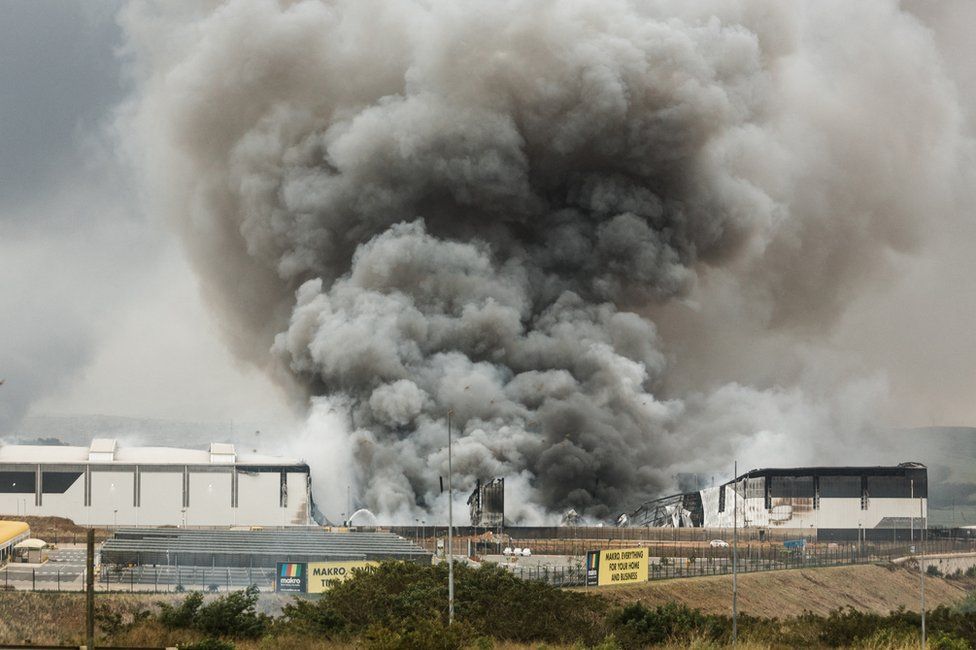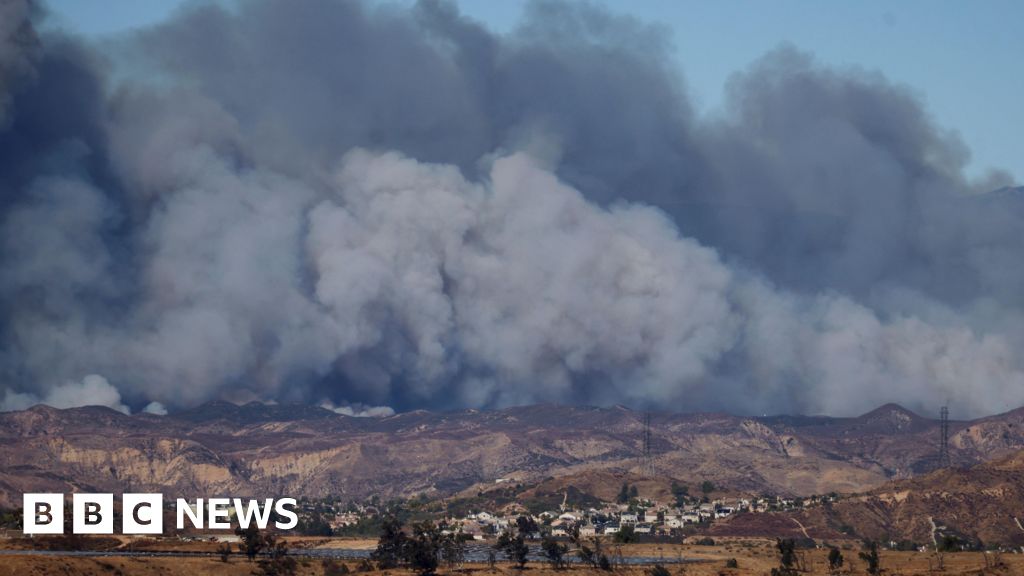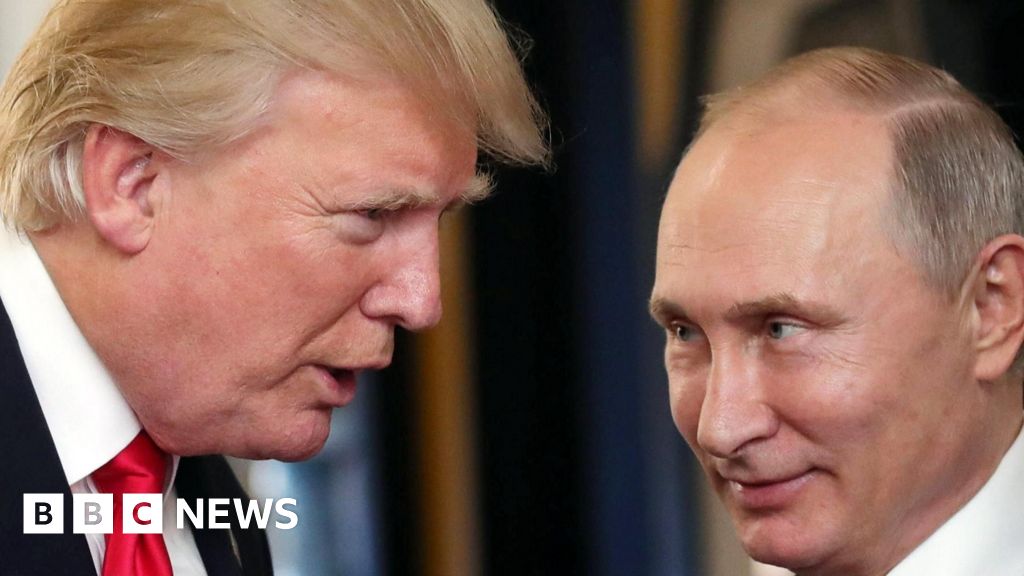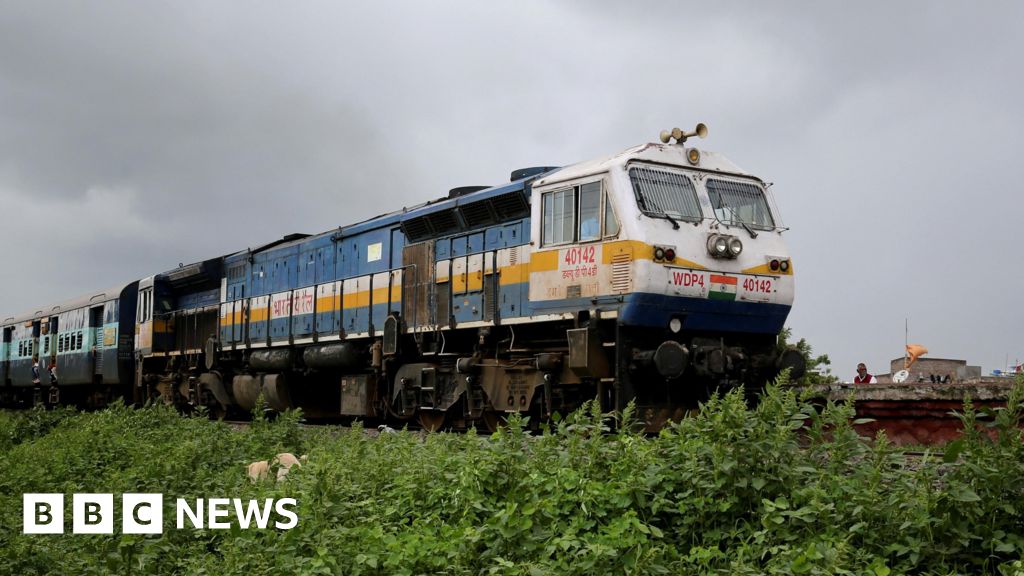ARTICLE AD BOX
By Andrew Harding
Africa correspondent, BBC News, Durban
 Image source, AFP
Image source, AFP
One year after what South Africa's President Cyril Ramaphosa called a violent "insurrection" that led to more than 300 deaths, the country is still wrestling with profound political and economic challenges and enduring fears of more unrest.
The black skeleton of a burnt-out chemical plant looms over the N2 motorway as it meanders through pale green sugar-cane fields just north of Durban.
At many intersections you can still see the scars and stains left by the burning barricades that spread, with chilling speed, across this coastal region exactly a year ago, accompanied by a near week-long frenzy of arson, looting, and murder.
Hundreds of shops, malls and businesses were destroyed. Thousands of people lost their jobs.
The cost to South Africa's economy, according to an estimate cited by the president's office, was $3.4bn (£2.8bn). It was the worst violence to hit this country since the arrival of democracy in 1994.
The chaos was allegedly triggered by political allies of the country's disgraced former President Jacob Zuma, in reaction to his imprisonment for contempt of court.
Zuma still enjoys the support of a left-wing faction in the governing African National Congress (ANC) which has also been linked to the corruption that flourished during his presidency.
Zuma's own children took to social media, urging rioters to "let everything burn", and even advising them to loot "carefully and… responsibly".
In its earliest stages, the violence and arson appeared carefully orchestrated and coordinated.
For a few, gut-wrenching days, it felt to many here as though this young democracy was sliding towards some kind of precipice.
Image source, AFP
Image caption,Shops and businesses were targeted by looters during the riots
In the months since then, despite Covid and devastating local floods, there have been indications that the province of KwaZulu-Natal is bouncing back.
Businesses have reopened. Many shopping malls have been rebuilt. At least some tourists are returning to the Indian Ocean beaches.
"We South Africans are resilient," says Brett Moran, who works for a private security company that helped protect the seaside town of Ballito during the unrest.
"But maybe we're too resilient. We forget… too quickly," he adds.
The idea of a country being "too resilient" might seem odd.
But it reflects South Africa's extraordinary capacity to absorb and tolerate crises - including staggering levels of corruption, record-breaking unemployment, a culture of impunity, and widespread infrastructural collapse - without showing much apparent urgency about the need to change course.
Which is why, in communities around Durban and beyond, many people fear that last year's unrest was not a one-off, and that the country may be sleepwalking into deeper trouble.
"This [unrest] is being organised by a disgruntled bunch from within the ANC. They still want Zuma to be president," says Thulani Mthetwa, a community organiser in a poor informal settlement across the motorway from prosperous Ballito.
It was President Cyril Ramaphosa who, chillingly, diagnosed last July's violence as "an attempt to provoke a popular insurrection" and as "a deliberate, coordinated and well-planned attack on our democracy" by elements within his own party.
Image source, AFP
Image caption,Local community members came out to defend their neighbourhoods against potential looters
The failure of what the president saw as an uprising - largely due to local communities rallying to protect themselves and the deployment of thousands of soldiers - gifted him a valuable opportunity to seize the initiative and to strike back against the forces of chaos in South Africa.
One year on, how much progress has been made?
The encouraging news is that a years-long public inquiry into the corruption of the Zuma era recently delivered a damning assessment. It provided prosecutors with mountains of evidence for future cases.
The inquiry - known as the Zondo Commission - may yet be seen as a watershed moment, dramatically weakening the Zuma faction within the ANC, re-energising the fight against corruption and potentially freeing Mr Ramaphosa to push ahead with deeper reforms.
But there are reasons to be sceptical.
For a start, not a single prominent politician has been charged in connection with last year's violence, most likely because the criminal justice system has been weakened by years of political meddling and mismanagement.
Many figures implicated by the Zondo Commission still hold powerful positions within the ANC as they seek to challenge internal disciplinary procedures for their own advantage.
"Nobody is going to be charged. South Africa has become desensitised," says Phumzile van Damme, a former opposition MP and disinformation expert, now mulling a return to politics
"The state is collapsing. I think we're moving fast towards collapse."
Then there's President Ramaphosa himself.
South Africa breathed a collective sigh of relief when the soft-spoken union leader turned businessman pushed the scandal-scarred Zuma out of office in 2018.
Mr Ramaphosa was widely viewed as a clean, principled figure, who could steer the ANC, and the country, away from the cliff's edge.
But that early optimism is fading.
Some blame the president himself - accusing him of being too much of a consensus-builder, and too slow to crack heads and assert his authority.
Others point to a fresh political scandal, orchestrated by his enemies, but involving potentially serious questions about an alleged theft and cover-up at his private game farm, which could now threaten his grip on power. The president denies any wrongdoing.
But, for many here, the inescapable conclusion is a broader one - that the task of reforming a former liberation party that has been in power for nearly three decades is simply impossible.
"Cyril [Ramaphosa] is not the solution. People in the ANC know what reforms are required, but they can't bring themselves to carry them out," says Songezo Zibi, a prominent intellectual and political activist.
Image source, AFP
Image caption,President Cyril Ramaphosa went to Durban last year to see the impact of the violence for himself
And the ANC's failings have now taken on an urgent new clarity for many South Africans.
It is deep winter here in South Africa, with nightly temperatures often dropping below zero on the high plains around Johannesburg. But the entire country is now in the grip of long, daily power cuts, known euphemistically here as "load shedding".
They are the result of decades of poor planning and mismanagement in the energy sector, combined with industrial action, disturbing incidents of sabotage (some allegedly linked to the ANC's internal feuds) and, as revealed by the Zondo Commission, staggering levels of corruption.
The blackouts, combined with last year's riots, have contributed to an accelerated flight of capital from South Africa.
So, what might stop the rot?
For some, the answer lies in the next nationwide elections in 2024, which could very well see the ANC lose its majority for the first time.
If that were to happen, the country could enter a new and potentially invigorating period of coalition politics, ripe with opportunities for smaller political parties.
"There's a great chasm in the centre of South African politics, especially with middle-class urban voters [who want] a united country and a strong anti-corruption stance," said Ms Van Damme, formerly a member of the opposition Democratic Alliance.
But the ANC's struggles - over whatever timeframe they play out - do not guarantee a smooth electoral transition for South Africa.
For a start, no single opposition party appears ready to replace it. And there is concern that disruptive radical parties on the left and, increasingly, on the right, may emerge as the biggest winners, potentially pushing South Africa towards xenophobia and even greater lawlessness.
'We are in denial'
Looming over all these possible outcomes is one that scares some South Africans the most - the possibility that the ANC simply refuses to surrender power at the ballot box.
"We're still in denial. We've been kidding ourselves with unfounded optimism for too long. I believe the ANC will attempt to rig the [next] elections in various ways," says Mr Zibi, warning that South Africa was now in danger of following neighbouring Zimbabwe's perilous political and economic collapse.
But none of this is inevitable.
"The ANC is in a very parlous state. It may try [to rig elections] but the [electoral] institutions themselves are still strong. I think the country can be turned around, but not by the ANC in its current state," said Mavuso Msmimang, a veteran of the anti-apartheid struggle and powerful moral voice in the ANC.
If President Ramaphosa manages to hold on to power, the slow process of rebuilding damaged institutions like the prosecutor's office may result in a surge of convictions for corrupt officials.
Bold new movements, backed by an active civil society and private sector could re-energise South African politics.
And the country's famous resilience - learned the hard way during the years of racial apartheid - could yet help nudge South Africa back onto the promising path it embarked on almost three decades ago.
More stories from South Africa:

 2 years ago
21
2 years ago
21








 English (US) ·
English (US) ·